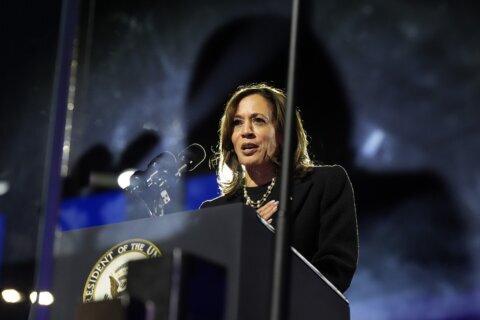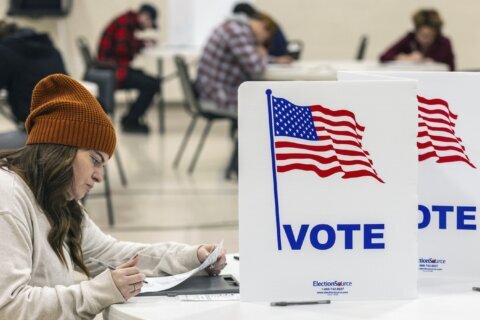A sitting congressman, Republican Steve King of Ohio, wondered aloud in a tweet whether former Secretary of State and Democratic nominee Hillary Clinton would be “on her meds or off her meds.” His GOP colleague, Rep. Robert Pittenger, said the African-American protesters in his home state of North Carolina “hate white people, because white people are successful and they’re not.” An Ohio county chair for Republican Donald Trump’s campaign resigned after blaming President Barack Obama for racism and saying African-Americans have an unfair advantage over whites. And a former aide for Rep. Joe Heck, R-Nev., took to Twitter to question the Mexican-American heritage of the Mexican-American Democratic Senate nominee, adding that the identification was only important in applying for scholarships or running for office.
In past political seasons, such comments might have dominated the national news or doomed a candidate’s campaign. But in the current environment, when insults and outrageous comments come too fast for pundits and voters to digest before the next one surfaces, offensive and racist remarks become just another part of the modern election dialogue.
“The rules have changed, and that includes the rules for what is acceptable and not acceptable. The shock value is gone,” says Lee Miringoff, director of the nonpartisan Marist Institute for Public Opinion in Poughkeepsie, New York. Whether because of political polarization or the campaign against so-called political correctness, “The rules of civility definitely have taken a back seat. This is becoming part of our mode of interaction and people are saying things that would have been totally absurd not too long ago — and still are, for some people.”
In 2006, then-Virginia Sen. George Allen repeatedly called a Democratic volunteer “tracker” — someone who follows the opposing campaign and records them, hoping they’ll say something foolish — a “macaca.” Allen apologized for the characterization after being told it was considered a racial slur against African or Asian immigrants. But Allen lost anyway, with the episode used against him in his tight race for re-election.
In 2012, Rep. Todd Akin, R-Mo., was well on his way to unseating Democratic Sen. Claire McCaskill until he told an interviewer that women can’t get pregnant in cases of “legitimate rape.” McCaskill cruised to re-election, in large part because of a 21-point advantage among female voters. Republican Indiana Senate candidate Richard Mourdock lost in the red state the same year after he said that pregnancy after a rape was “something God intended.”
Such remarks at the time were politically scandalous and political career-ending for those candidates. Now, in a season when the GOP nominee has called Mexican immigrants “rapists” and “criminals” and has questioned the ability of a Latino judge to be impartial, the scandals of yore seem almost quaint. And while Clinton has run many ads showcasing Trump’s remarks about women, immigrants, veterans and disabled people, the two contenders are still neck-and-neck in national polls, indicating that Trump’s remarks aren’t damaging him with voters.
“Trump doesn’t come out of nowhere, but he certainly has taken it to a new level,” says Peter Montgomery, senior fellow at People for the American Way, a civil liberties group which has been very critical of Trump. Part of the escalation in rhetoric, Montgomery says, has been the advent of technology, which he says has allowed extremists to connect with one another and become more emboldened in their message. The push-back against “political correctness,” or what some see as an excessive effort to massage language to avoid offense, has also led some people to let loose on Twitter and other social media platforms, Miringoff and others say. And the ease of social media might make some people more likely to say something online they might not utter in person or write on paper.
But the line, experts agree, has definitely moved this election season, with even people in elected office (or seeking it) saying things that would have lost them their jobs or influence not long ago. In 2002, for example, then-Senate Majority Leader Trent Lott lauded his Republican colleague, South Carolina Sen. Strom Thurmond, at his 100th birthday party, noting that Lott’s home state of Mississippi had voted for former segregationist Thurmond for president in 1948. “We’re proud of it. And if the rest of the country had followed our lead, we wouldn’t have had all these problems over all these years either,” Lott said at the celebration.
Lott saw it as a relatively innocuous, kind remark to an aged colleague. But others — including then-President George W. Bush — slammed Lott, who was forced to step down as majority leader. Pittenger has apologized, but has suffered no other fallout from his remarks. Heck, despite repeated demands from Democratic nominee Catherine Cortez Masto, has refused to apologize for the remarks by the former campaign aide, who also accused Cortez Masto of “hispandering.” And it’s not clear it will matter.
“There’s the media-Twitter conversation, and then there’s the voter,” says University of Nevada Las Vegas political science professor David Damore. Cortez Masto could use the slur as an opportunity to get more Latinos out to vote, and that could conceivably make a difference in the tight race, he says. But many of her voters are more focused on the presidential race and a referendum about funding a stadium for a new NFL team, Damore says. “The broader electorate… It probably doesn’t care” about the slur, he adds.
Miringoff says the peculiarly brash tone of the Trump campaign has had a ripple effect. “Trump has run up a whole line of” insults. “That gives cover to others,” Miringoff says.
But don’t expect the tone to change after the election, Montgomery warns. “I think that’s going to be very damaging to the country whether or not Trump wins,” Montgomery says. “You can’t put it back in the bottle.”
More from U.S. News
Penthouse Populist: Why the Rural Poor Love Donald Trump
Donald Trump Says Birther Announcement Was to ‘Get on With the Campaign’
Personal Insults Now Part of the Political Mainstream originally appeared on usnews.com







